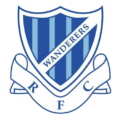Club History
Since 1924
A Century of Endeavour, A Legacy of Excellence
The Wanderers Rugby Club has a storied history of nurturing exceptional talent and contributing significantly to representative rugby. From its foundation years through the decades, Wanderers players have consistently earned recognition at state, national, and even international levels.
This article highlights the remarkable achievements of Wanderers’ senior players (U19 and above), as documented in the club’s history database selected for NSW Country or above. It also touches on their significant contributions to rugby in Newcastle, NSW, and beyond. Research details can be read in the historical summary.
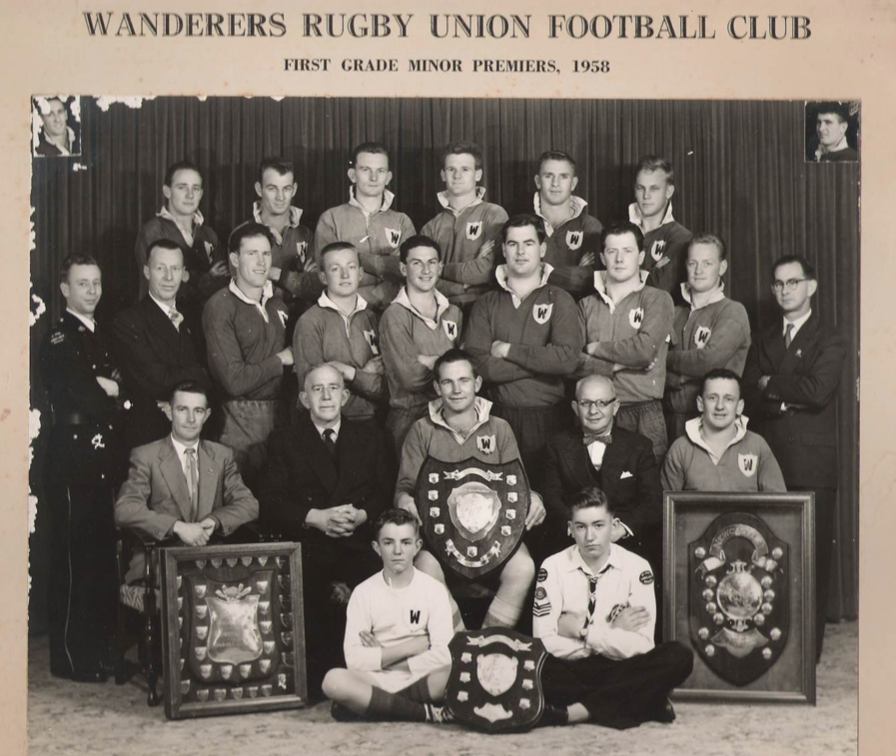
National Representation: A Mark of Distinction
From 1925 to 2022 there has been a total of twenty Wanderers senior players that have represented at national level. Twelve for Australia and one for Australian U19 and U21. Additionally, there was one player with the Emerging Wallabies in 1992 and Australian 7s in 1993, and another with the Australian Barbarian 7s in 2000. In 1999 there were also three players with the Australian Police Squad and two players with Australian Navy. Twenty three (23) senior players have represented NSW and 53 with NSW Country.
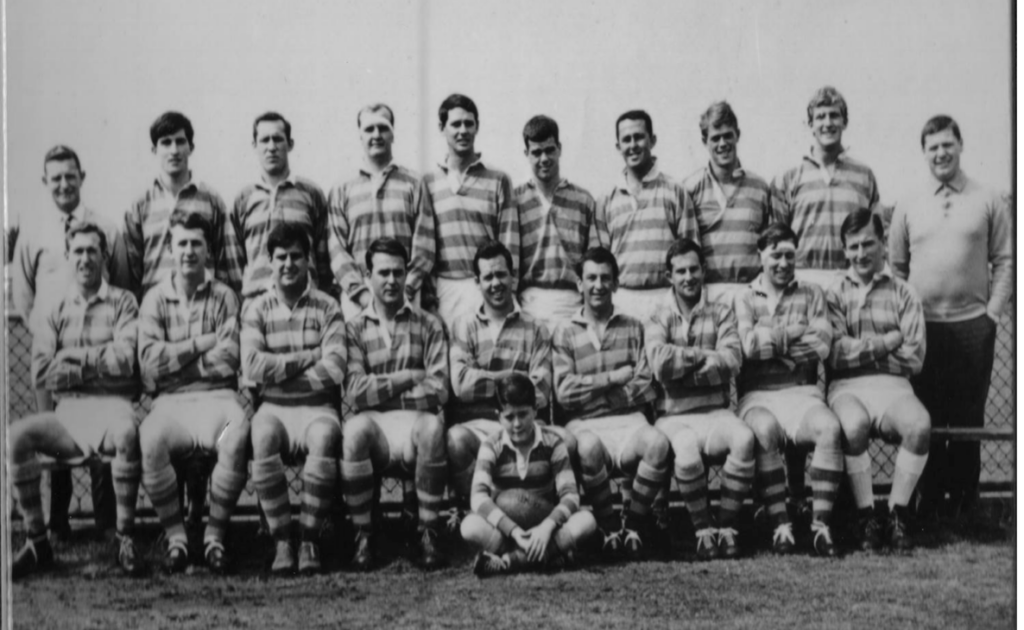
Pioneers and Icons: The Foundation Years (1925–1939)
Wanderers boasted exceptional talent within their ranks, with several players achieving selection in state and national representative teams. Although Charles Morrissey was the first Wanderer to achieve selection in an Australian team, Ken Burke was most outstanding of the foundation era.
Charles “Tug” Morrissey was Wanderers’ first Australian representative, achieving Wallaby cap 216 in the 1920s. A standout athlete from Saint Ignatius College, Riverview, Morrissey represented Australia in five international matches. Ken Burke, one of three Burke brothers who played for Wanderers, was a star of the foundation era and pivotal in securing Wanderers’ first premiership. His representative career included selections for NSW and NSW Country.
Other representatives before 1939 included Roy Cant, D. “Bunny” Greaves, G. Pooley, L. Street, T. Duncan, Phil Parbury, Harry Hingst, and Jan McShane.
McShane was a Rhodes scholar who had captained NSW in 1933 and taken up residence in Newcastle. He joined Wanderers in 1937. During that season he represented Australia in two tests against South Africa, and NSW against the Springboks and Queensland. McShane was the only Wanderers player included in the 1937 Newcastle squad from which a team was selected to play Combined Western Districts at Manly Oval. He was capped as Wallaby 305.
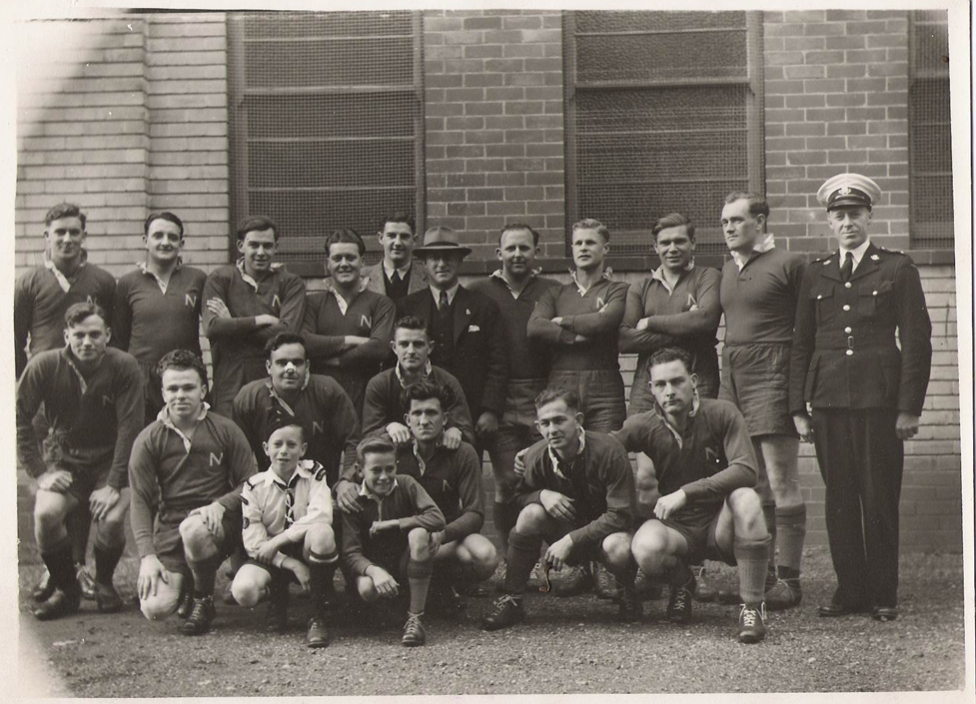
The Roaring 40's
It was no surprise that numerous Wanderers players represented Newcastle and Northern NSW during the “roaring 40s”. Those repeatedly selected in Newcastle teams during the decade included Peter Preston, Jack Robinson, Ron Worboys, Tony Hudson, Charlie Drinkwater, Jack Risby, Jim Lines, D. Marr, Pat Walsh, W. (Bill) Harvey, J. Murray, Col Lowth, Gordon Cady, Bruce Moore, Gordon “Joe” Dyas, D. Williams, J. Braun, R. Howard, K. Shortridge, W. Riordan, W. (Bill) Rawle, J. Elliott, N. Baker and Peter Turnbull.
Peter Preston was a highlight of the decade, earning selection for NSW in 1946 and making history for Newcastle rugby.
Jack Risby, a long-striding prolific scorer, gained acclaim for his performances and in only his third year of rugby union was selected at fullback in the 1946 Newcastle team that played New England. He became a popular figure on the wing for Wanderers whose form gained media attention. Dubbed ‘Long Tack’ by enthusiasts, his ‘smothering’ of international Charlie Eastes in Sydney was a testament to his reputation as a prolific scorer and a fearless defender.
In 1947, Worboys (captain), Preston, Cady and Clarke played for Northern NSW against the All Blacks. Preston and Gardner also represented the State against the New Zealand Maoris two years later.
The club’s first Australian cap since reformation was won by Bill Gardner, a diminutive fullback who joined the Two-Blues in 1948. During his second season with the club, Gardner then aged 20, was selected as a starting player for Newcastle, for NSW along with Peter Preston against the NZ Maori at Newcastle No 1 Sports Ground and as reserve for Australia. His notable performance with the NSW team ultimately earned him selection in the Australian team to tour New Zealand.
The following year saw Gardner play for his country against the British Lions in Brisbane. His promising career was cut short a few months later when he was diagnosed with polio. Gardner will long be remembered for his clever placement kicking and fearless approach to last-line defence.
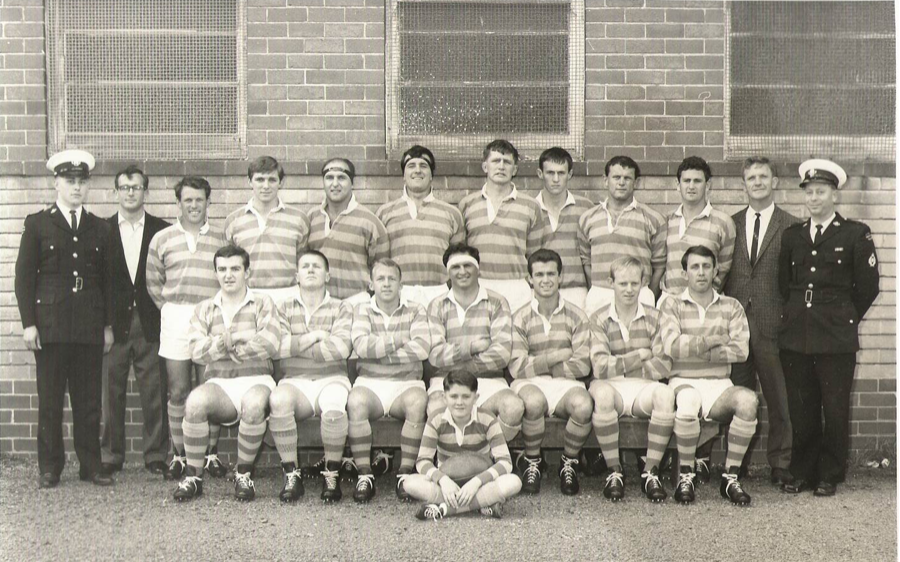
Post-War to 1960s Success
Wanderers produced several national and state representatives during the 1950s and 1960s.
Representatives during the 1950’s included Phil Alston, John Halter, and Peter Doyle, who all represented Newcastle in 1954 and contributed significantly to Wanderers’ success. Ron Meadows and Terry Curley emerged as standout Wallabies in the late 1950s, with Meadows famously remarking, “We beat the bastards, didn’t we?” after a Wallabies win over the All Blacks in 1957.
The Hawthorne Era and the 1960s Boom
Wanderers boasted exceptional talents like Bruce Gilroy, John Young, Russell Blackley, Phill Blackley, Allan Braye, and Brian Ogg, who represented Newcastle in the 1960 match against the Barbarians.
Wanderers again dominated selections for the 1966 representative calendar, with P. Hawthorne, I. Dent, A. Back, M. Hawkins, D. Wroe, R. Turnbull, M. Jenkinson, J. Young, M. Jones, B. Robinson and debutant A. Bland all featured for Newcastle at Country Week.
Players like Phil Hawthorne, Don Wroe, Ian “Ikey” Dent, Ross Turnbull, and Michael Jenkinson dominated representative selections in the 1960s. Hawthorne represented NSW and Australia, while Turnbull and Dent became key figures in Newcastle and NSW Country rugby.
The trials to select the Australian touring party for South Africa in 1963 featured multiple Wanderers players, including Phil Hawthorne, John Attwater, Don Wroe, Mike Jenkinson, Ross Turnbull, John Halter, and Ian “Ikey” Dent. Ikey Dent’s exceptional kicking skills propelled him above state and national representative Jim Lenehan.
Representative Honours in the 1970s and 1980s
During the early 1970s, players like Robert Armstrong, Michael Hawkins, Morgan Jones, Chris Mahony, Ross Turnbull, Keith Read and Don Wroe anchored the Wanderers first-grade team. Four of these men, Mahony, Wroe, Turnbull and Read along with Tim Duval, wore Newcastle’s colours to success during the 1970 Country Week.
The 1975 premiership-winning side, captained by Mahony, saw its entire backline represent Newcastle at various times. Key representatives included Chris Maloney, Gary Osmond, Phil “Storky” Whetham, Fred Wivell, Peter Cook and David McKinley, who earned NSW Country and State honours.
Captain Chris McClelland, a key figure for the team, earned representative honors for Newcastle, while promising young players were also unveiled in 1986. Chris McClelland and Darren Forward achieved representative honors for NSW Country and NSW U21, respectively.
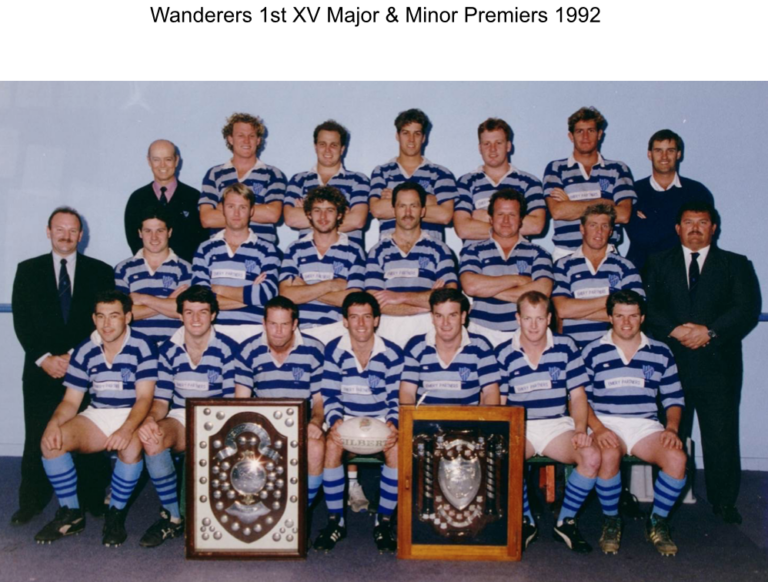
Emerging Juniors and 1990s Success
The 1990 season showcased the strength of the club across multiple grades, with standout players like Scott Carroll, Jeremy Sargent, Andrew Liddard, Les Bennett, and Jon Springthorpe representing the Newcastle side.
Wanderers juniors transition successfully into senior rugby during the decade. This was most evident in 1992 as Graeme Thomson and Stuart Pinkerton earned accolades. Both players were named in the senior NSW Country squad without having played a first-grade match. Pinkerton further distinguished himself by earning a spot in the Australian under-19 team for the inaugural test series against the junior All Blacks in New Zealand. Graeme Thomson’s exceptional performances led to his selection in the Australian Sevens squad for a tournament in Montevideo, Uruguay. These achievements highlighted the club’s commitment to nurturing young talents.
The Modern Era Highlights
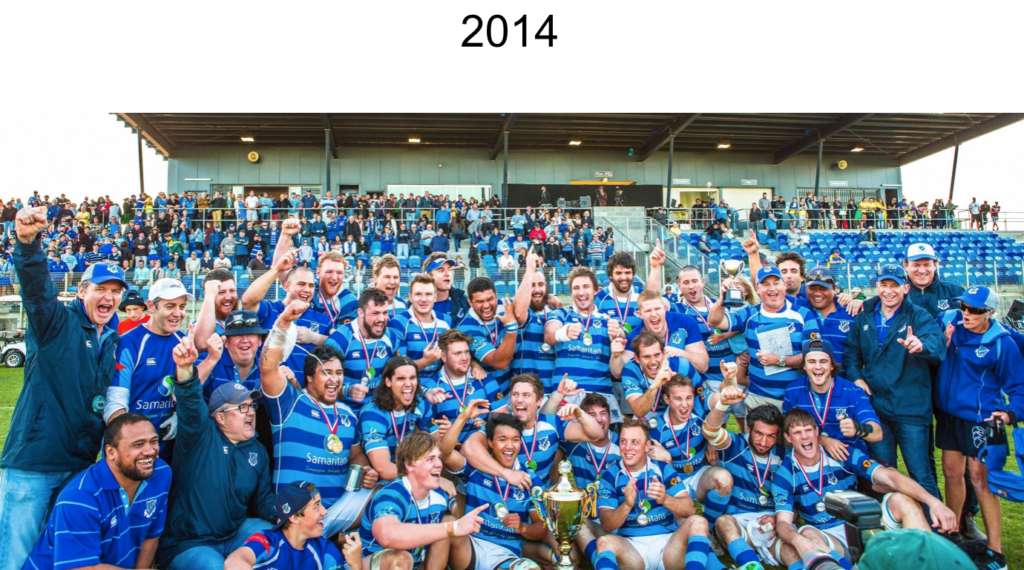
The early 2000s witnessed a golden era for Wanderers Rugby Club, producing a wave of exceptional talent that graced representative teams at various levels.
The 2000 and 2001 first-grade squads were a breeding ground for future stars. Fifteen players from the 2001 squad, including Matt Brown, Nathan Croft, Brent Dale, and Julian Morton, earned selection for the Newcastle representative team. Several, such as Croft, Brown, and Dale, further enhanced their careers by representing NSW Country. Notably, Todd Henderson was awarded the prestigious Anderson Medal in 2001.
The following years saw continued success at the representative level. In 2003, Guy Perrin was named Newcastle & Hunter Representative Player of the Year, while Michael Lee claimed the Newcastle and Hunter Colt of the Year – Jack Scott Memorial Medal. Greg Thompson further solidified Wanderers’ reputation by winning the Newcastle and Hunter Player of the Year – Anderson Medal. Fiona Niddrie also achieved significant recognition, being named a joint winner of the Hunter Women’s Rugby Union Representative Player of the Year.
The 2004 and 2005 seasons saw Guy Perrin and Jono Wilson consistently represent NSW Country Cockatoos. This success continued in 2006 with the addition of Gareth Williams, Dan Kevill, and Michael Lee to the NSW Country contingent.
The club’s commitment to developing young talent was evident in 2006 with the emergence of Nathan Sherwood and Sam Littlewood from the Colts, earning selection for NSW Country U19. Greg Smith-O’Neill further enhanced this success by gaining selection for NSW Country U20 and being recognized as the NHRU Colt of the Year.
In 2007, Greg Thompson, Jono Williams, Ben Sattler, Simon Yanis, and Gareth Williams earned Newcastle representative honors, while Michael Lee achieved dual representation for both Newcastle and NSW Country.
The year 2008 saw continued success with Michael Lee, Marcus Simpson, Simon Yanis, and Robert Aston representing Newcastle and NSW Country.
These achievements highlight the consistent production of high-quality players at Wanderers Rugby Club, solidifying their position as a prominent force in the local and regional rugby landscape.
